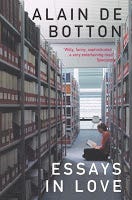The philosophy of love

Amongst other things I am currently reading Essays in Love, by Alain de Botton. It’s a book on the philosophy of a love story. Because I need all the help I can get. No, some of it is not at all helpful, being written from a completely different worldview. But it has had it’s enlightening moments, being written by a male about the process of falling and being in love – even if he is perhaps more philosophical and introspective than most - and in places it’s hysterically funny!
I like Alain de Botton for a bit of pop-philosophy. I heard him speak once, which inclined me to like him more. He stood there as an unassuming, foppish sort of chap in dull clothes who was interesting and entertaining, without having to do anything more than talk for an hour. And the book extends beyond the romantic. Here’s an excerpt, which is by no means the most profound insight in the book, and nothing all that new, but I thought it was a good sort of reminder and prompt, from the chapter called ‘I’ - Confirmation. Read on till he brings in the idea of a loving God, and includes implications for community and knowing and influence (and thankfully, re point 9, God does ascribe a correct identity to us).
2. Perhaps it is true that we do not really exist until there is someone there to see us existing, we cannot properly speak until there is someone there who can understand what we are saying, in essence, we are not wholly alive until we are loved.
3. What does it mean that man is a ‘social animal’? Only that humans need one another in order to define themselves and achieve self-consciousness, in a way that molluscs or earthworms do not. We cannot come to a proper sense of ourselves if there aren’t others around to show us what we’re like. ‘A man can acquire nothing in solitude except a character,’ wrote Stendhal, suggesting that character has its genesis in the reactions of others to our words and actions. Our selves are fluid and require the contours provided by our neighbours. To feel whole, we need people in the vicinity who know us well, sometimes better, than we know ourselves.
4. Without love, we lose the ability to possess a proper identity, within love, there is a constant confirmation of ourselves. It is no wonder that the concept of a God who can see us has been central to many religions: to be seen is to be assured that we exist, all the better if one is dealing with a God (or partner) who loves us. Surrounded by people who precisely do not remember who we are, people to whom we often relate our stories and yet who will repeatedly forget ... is it not comforting to be able to find a refuge from the dangers of invisibility in the arms of someone who has our identity in mind?
5. It is no coincidence if, semantically speaking, love and interest are almost interchangeable, ‘I love butterflies’ meaning much the same as ‘I am interested in butterflies’. To love someone is to take a deep interest in them, and by such concern to bring them to a richer sense of what they are doing and saying ...
...
7. It was a long time before I was in any position to help Chloe to feel understood. Only slowly did I begin to unearth, from among the millions of words she spoke and actions she performed, the great themes of her life. In our knowledge of others, we are necessarily forced to interpret clues, we are like detectives or archeologists who piece together stories from fragments ...
9. The problem with needing others to legitimate our existence is that we are very much at their mercy to have a correct identity ascribed to us ...
10. Everyone returns to us a different sense of ourselves, for we become a little of who they think we are. Our selves could be compared to an amoeba, whose outer walls are elastic, and therefore adapt to the environment. It is not that the amoeba has no dimensions, simply that is has no self-defined shape. It is my absurdist side that an absurdist person will draw out of me, and my seriousness that a serious person will evoke. If someone thinks I am shy, I will probably end up shy, if someone thinks me funny, I am likely to keep cracking jokes.
...
17. Though I felt myself attentive to the complexities of Chloe’s nature, I must have been guilty of great abbreviations, of passing lightly over areas I simply did not have the empathy or maturity to understand. I was responsible for the greatest but most unavoidable abbreviation of all, that of only being able to participate in Chloe’s life as an outsider, someone whose inner world I could imagine, but never directly experience. However close we might be, Chloe was in the end another human being, with all the mystery and distance this implied, the inevitable distance embodied in the thought that we must all die alone.
And so it goes on.

